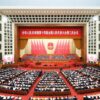President Biden’s plan to counter Russia faces obstacles in an interconnected world. Russia also has a new, if not very enthusiastic, partner in standing up to the West: China.
WASHINGTON — More than 75 years ago, faced with a Soviet Union that clearly wanted to take over states beyond its borders, the United States adopted a Cold War approach that came to be known as “containment,” a simplistic-sounding term that evolved into a complex Cold War strategy.
On Thursday, having awakened to a violent, unprovoked attack on Ukraine, exactly the kind of nightmare imagined eight decades before, President Biden made clear he was moving toward Containment 2.0. Though it sounds a lot like its predecessor, it will have to be revised for a modern era that is in many ways more complex.
The nation that just moved “to wipe an entire country off the world map,” in the words of Chancellor Olaf Scholz of Germany, also remains a key supplier of natural gas to keep Germans and many other Europeans warm. That explains why Mr. Biden has been constrained from cutting off the valuable export. And the Russia of today has a panoply of cyberweapons that it can use to strike at the United States or its allies without risking nuclear Armageddon — an option to retaliate against American sanctions that was never available to President Vladimir V. Putin’s predecessors.
Those are only two examples of why containment will not be easy. But Mr. Biden has been clear that is where he is headed.
For three decades, American presidents described a series of Soviet and Russian leaders as “businesslike” or even “partners.” They celebrated “glasnost” and ushered Moscow into the World Trade Organization and the Group of 7 industrial nations. Washington even entertained the idea in the 1990s — very briefly — that one day Russia could join NATO. No one has talked that way in years. But Mr. Biden, who came to office last year talking about establishing a “stable, predictable” relationship with Moscow, spoke of a completely ruptured relationship on Thursday.
“Now the entire world sees clearly what Putin and his Kremlin allies are really all about,” Mr. Biden said in a speech from the White House. “This was never about genuine security concerns on their part. It was always about naked aggression, about Putin’s desire for empire by any means necessary, by bullying Russia’s neighbors through coercion and corruption.”
He vowed to make Russia pay “dearly, economically and strategically,” and to make Mr. Putin a “pariah on the international stage.” Those words might have even been familiar to George F. Kennan, the American foreign service officer who became famous as the grand strategist who invented containment, though he later warned, at age 94, that expanding NATO to Russia’s borders was a bad idea, bound to become “the beginning of a new Cold War.”
The “containment” Mr. Kennan described in his famous “Long Telegram,” an 8,000-word dispatch from the American embassy in Moscow, was primarily aimed at putting geographical limits on Soviet ambitions. But even though the Long Telegram was long, it spent the most time explaining the psychology of Stalin’s regime, which Mr. Kennan described as paranoid, viewing the outside world to be “evil, hostile and menacing.”
The similarities to Mr. Putin’s speech on Monday night, in which he accused Ukraine of triggering genocides and seeking nuclear weapons — both false claims — and the United States of seeking to use Ukrainian territory to strike at Moscow, are striking. So was his description of America’s “empire of lies.”
But as Richard N. Haass, the president of the Council on Foreign Relations, said on Thursday, “It’s much more complicated to make containment work today.”
The Soviet Union largely presented a military and ideological challenge, he noted. Yet modern-day Russia is a provider of needed fuel and minerals, “and that gives them leverage over us, even as we have leverage over them.” The force of that leverage was made clear from Mr. Biden’s answer to a question on Thursday about why Russia had not been thrown out of SWIFT, the global communication system for financial transactions.
Barring Russia from that system would be a devastating move, cutting off its government from oil and gas revenue. That accounts for about 40 percent of its incoming cash and would be the one sanction almost certain to hurt Mr. Putin like no other.
But Mr. Biden noted in his speech that “in our sanctions package, we specifically designed to allow energy payments to continue.” When asked about barring Russia from SWIFT, he added, delicately, “Right now, that’s not the position that the rest of Europe wishes to take.” In fact, the debate over SWIFT has been a source of tense behind-the-scenes exchanges, chiefly with Germany. The German objection is clear: If the country cannot pay for its gas, Russia will not deliver it.
But the second reason containment may not work is that Russia has a new, if not very enthusiastic, partner in standing up to the West: China.
When Mr. Kennan described containment theory, China was in civil war. Later in the Cold War, when Russian leaders met their Chinese counterparts, Russia was the dominant player of the two countries. No longer. Last weekend, when China’s foreign minister told participants at the Munich Security Conference that Ukraine’s borders needed to be respected, people sat up in their seats.
It sounded, for a moment, as if China was reining Russia in. But that was Saturday. On Thursday, as Russian forces shelled Ukraine, the Chinese government said that it had approved several deals announced during Mr. Putin’s trip to Beijing for the Winter Olympics this month, including one to buy vast amounts of Russian wheat. The word “sanctions” never appeared in the Chinese announcement about the deals this week.
When Mr. Biden was asked on Thursday whether he was urging China to help isolate Russia, he hesitated and then said, “I’m not prepared to comment on that at the moment.”
Containment has another challenge that Mr. Kennan could not have envisioned: the rise of cyberconflict as a short-of-war mechanism for superpowers to attack each other from afar, without resorting to nuclear weapons.
Microsoft reported in October that 58 percent of the state-sponsored cyberattacks it had tracked around the world in the past year had emanated from Russia. And that does not count the criminal ransomware gangs that work from Russian territory.
Understand Russia’s Attack on Ukraine
What is at the root of this invasion? Russia considers Ukraine within its natural sphere of influence, and it has grown unnerved at Ukraine’s closeness with the West and the prospect that the country might join NATO or the European Union. While Ukraine is part of neither, it receives financial and military aid from the United States and Europe.
Biden administration officials make no secret of their concern that Russia views its arsenal of disruptive cyberweapons as a way to strike back at American sanctions. Now that Mr. Biden has announced sanctions against some of Russia’s biggest banks, a well-planned cyberattack might be the most efficient way for Russia to try to retaliate against American financial institutions. But as Russia learned last year, the target set of vulnerable American infrastructure is much larger.
Mr. Biden’s one meeting last year with Mr. Putin, in Geneva, was prompted by the Colonial Pipeline hack, which shut down nearly half of the flow of gasoline, jet fuel and diesel on the East Coast — and triggered gas lines at a time of plentiful supply. It was an event that shook the White House and taught the Kremlin some lessons about the vulnerability of American critical infrastructure.
Mr. Biden emerged from the meeting offering some professional respect for Mr. Putin as an adversary. For his part, Mr. Putin said, “There has been no hostility.” At one point, Mr. Biden asked the Russian leader how he would feel if Russia’s gas pipelines were attacked from afar — a comment that some interpreted as a threat to the Russian leader.
For a few months, ransomware gangs were in retreat, and not long ago the Russian police, based on information from the United States, arrested a group of what they described as criminal hackers. But now there is fear that the ransomware gangs could be unleashed, as could hacking groups like Sandworm, which has been linked to the G.R.U., the Russian military intelligence unit. Sandworm is believed to be responsible for hacks of the Ukrainian power grid and multiple targets in the United States.
For more than a month, the director of the Cybersecurity and Infrastructure Security Agency, Jen Easterly, has been issuing a series of what she calls “Shields Up” tweets and making public appearances to encourage more resiliency in the nation’s privately-controlled computer networks.
Together with the British, the F.B.I. and the National Security Agency, Ms. Easterly’s agency recently revealed the technical details for a new strain of malware it has seen. It turns out that it was derived from one of the most destructive attacks ever conducted, which was aimed at Ukraine in 2017.
For America’s largest banks and utilities, this was old news: They have studied Russian attacks on Ukraine and other nations for years. But for companies that have invested far less in fending off attack, resiliency takes time to build up, so no one thinks that last-minute warnings to lock down vulnerable systems, while helpful, are enough.
For years, the U.S. government has warned that Russia has inserted malicious code in American networks, including the power grid, that could be triggered at a later date. (The United States has done the same in Russia.) But so far, Russia has been hesitant to unleash that “sleeper code.” The U.S.-led sanctions may tempt Russian leaders to unleash it, some speculate.
Then there is the problem of “digital fallout,” the phrase Ciaran Martin, the former chief of Britain’s National Cyber Security Center, used to describe attacks on Ukraine that “ripple outward to disrupt businesses and government around the world.”
It has happened before: The Russian-created “NotPetya” attack on Ukraine in 2017 ended up escaping Ukraine’s borders, crippling some operations for shipping firms like Maersk and FedEx.
“You could imagine very rapid escalation into what could be regarded as an attack on NATO,” said Senator Mark Warner, Democrat of Virginia and the chairman of the Senate Intelligence Committee, who has focused much of his energy on these kinds of scenarios. It is uncharted territory of a kind Mr. Kennan never had to consider.




























